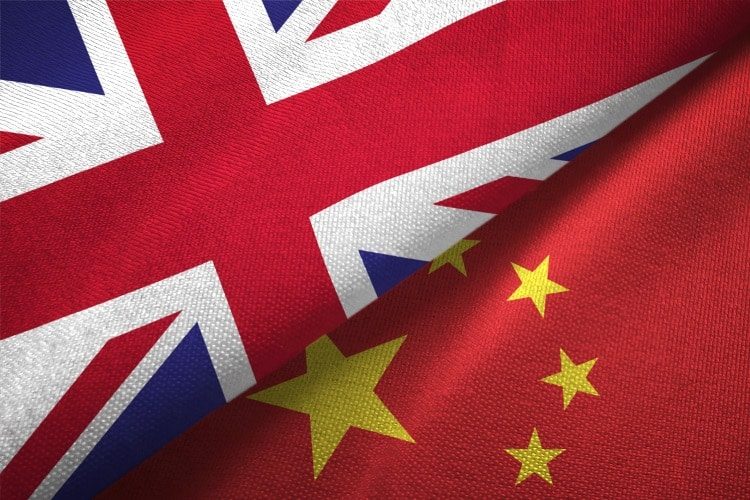
On April 25, the Financial Times (FT) reported that U.K. Foreign Secretary James Cleverly wants “robust and constructive” relations with China.
The same FT report added that Cleverly is poised to declare the following statements on May 2: “It would be clear and easy — perhaps even satisfying — for me to declare a new cold war and say that our goal is to isolate China. Clear, easy, satisfying and wrong. Because it would be a betrayal of our national interest and a wilful misunderstanding of the modern world.”
“I’ve engaged with senior Chinese foreign ministers, both Wang Yi and Qin Gang. There will probably be opportunities to engage with the Chinese officials or ministers here in the UK,” Cleverly remarked.
Furthermore, Cleverly said it was “almost inevitable” that he would visit China and dismissed calls to “pull down the shutters” on relations with the communist country.
Beijing was undertaking the “biggest military build-up in peacetime,” but it would be wrong to “declare a new Cold War” or seek to “isolate” China, Cleverly asserted in a speech.
Rather, Cleverly insisted that it would be better for Britain to enhance ties with the Asian powerhouse, especially to address “significant world problem[s]”, stating that no issue, “from climate change to pandemic protection, from economic stability to nuclear proliferation, can be solved without China.”
Even U.S. Treasury Secretary Janet Yellen has said that national security measures targeted at Beijing were not meant to “stifle” the Chinese economy, and that isolating oneself from China would be “disastrous.”
Observers have regarded Cleverly’s remarks with caution, with some viewing them as another effort by Rishi Sunak’s government to balance tensions with Beijing — notwithstanding frosty bilateral ties over Taiwan, human rights, and Asia-Pacific security — so as to hopefully convince Chinese authoritarian leader Xi Jiping to address and broker an end to the Ukraine conflict, among other issues.
When he became prime minister, Sunak had declared that the “golden age” of U.K.-China relations was over. However, he also lashed out at policies premised on “grand rhetoric” instead of pragmatism in remarks that analysts perceived to be targeted at his predecessor, Liz Truss.
Cleverly’s statements triggered an immediate outcry from Tory backbenchers.
Former Tory leader Sir Iain Duncan Smith slammed Cleverly as “naive” and his speech an “embarrassment,” contending that it was fruitless for Britain to try to cooperate with China, as Beijing did not give a “tuppenny damn” about the country.
Luke de Pulford, executive director of the inter-parliamentary alliance on China, wrote that he “regret[s]” the shift in tone, which now sees the foreign secretary “taking a swipe at concerned backbenchers,” many of whom take a much tougher position on Beijing.
Pulford even asked, “Did anybody brief the foreign secretary that Xi Jinping has never kept a climate promise, and uses the climate issue as a diplomatic bargaining chip against naive governments?”
In turn, Cleverly brushed his critics aside, saying,
Dealing with the Chinese government, the Chinese Communist Party, is not for the faint-hearted, and not engaging with them is not a sign of strength. You could argue that would be a sign of weakness, or certainly an indication that we didn’t have the self-confidence to go into these engagements in the belief that we can make a difference. I am not going to silence myself just because standing up and speaking is going to be difficult. And it is going to be difficult — we absolutely recognise that — but we do it nevertheless because it matters. Where we can cooperate we will seek opportunities to cooperate, but throughout this we’re going to be very clear-eyed that in some areas our values are fundamentally different.
In context, Sunak’s government has tried to ban some Chinese technology while keeping ties in areas such as trade, investment, and “green” activism open. During Sunak’s visit to California to ink the Aukus pact, he singled China out as an “epoch-defining challenge” to the global order, leading to Beijing retorting that Britain was in “inevitable decline after Brexit” and, together with the United States and Australia, was “walking down the path of error and danger.”
Last summer, Sunak blasted then-rival Liz Truss of “[rolling] out the red carpet and [turning] a blind eye to China’s nefarious activity and ambition.” Back then, Sunak pledged, “I will change this on day one as PM.” Yet Cleverly’s statements have caused many to question Sunak’s apparent shift in policy.
The Daily Telegraph’s report on Cleverly’s statements mentioned the need for China to “come clean about its ‘biggest military build-up in peacetime’ in a major speech warning of the risks of a new cold war with Beijing.” The topics of Taiwan and Chinese suppression of the Uyghur people were also mentioned, although some pundits think that Britain has seemed more enthusiastic about Beijing attaining “green” emissions targets than addressing human-rights issues.
Notably, U.K. officials claim Beijing has welcomed the possibility of Cleverly visiting. Nonetheless, the foreign secretary’s speech will outline areas where Britain remains at loggerheads with China, encompassing topics such as Taiwan, civil rights in Hong Kong, and China’s “creation of a 21st-century version of the gulag archipelago” to crack down on the Uyghur people in China’s north-western Xinjiang region. “Our revulsion is heartfelt and shared unanimously across our country and beyond,” Cleverly is expected to declare. “We are not going to let what is taking place in Xinjiang drop or be brushed aside.”
If Cleverly visits China, he would be the first British minister to head to China since Alok Sharma participated in climate discussions in Tianjin in 2021. Despite the backlash among Beijing hardliners, French President Emmanuel Macron could possibly lend a sympathetic ear to Cleverly’s statements, as the French leader has openly called for European strategic autonomy from America. That being said, in another speech on Britain’s ties with China, Cleverly dissented from Macron’s attempts to distance Europe from any potential war with China over Taiwan, with the British minister saying that “no country could shield itself from the repercussions of a war in Taiwan.”



